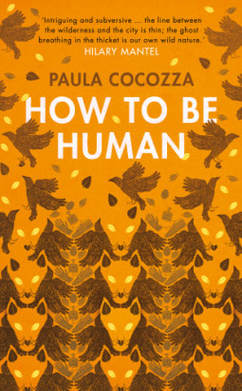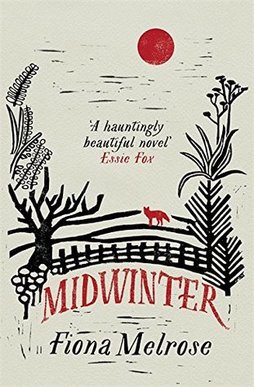How to Be Human by Paula Cocozza
When Mary arrives home from work one hot summer afternoon to find a fox sprawling in her London garden, he seems to offer her the alternate way of being she so desperately needs. Having recently separated from her partner, Mark, distant from her mother and her few friends, and subjected to HR procedures for lateness in the university HR department in which she works, she’s struggling with being human right now. On top of that, the couple next door have just had another baby when her own reluctance to become a mother was one of the problems in her relationship with Mark.
Mary feels blessed as the fox continues to visit from his den in the scrappy woodland behind the house, bringing her “gifts” such as a gardening glove, a shoe masticated almost beyond recognition and a hollowed-out egg. She feels they have a particular understanding, a relationship more equal than the one she had with Mark. But it becomes increasingly difficult to keep this secret from her neighbours – who, like most Londoners, perceive the foxes as vermin – especially Michelle, neurotically managing the chaos of new motherhood under a veneer of efficiency and control. As Michelle becomes more neglectful of baby Flora, Mary is surprised to discover the baby filling a gap within her. But when Mark arrives back on the scene it’s not with him Mary imagines constructing a family of three, but with the fox.
Beautifully written and psychologically astute, How to Be Human explores not only the boundary between urban and rural, and modernity’s ambivalence about the wild, but also the constantly shifting sands of autonomy and compromise within human relationships in general: between colleagues, neighbours and partners. For those, like Mary, whose blueprints for relationships come from emotionally distant mothers, having a mind of one’s own and carving out a place between the extremes of aloofness and surrender can be a struggle. As the novel progresses, the reader wonders at the balance between care and control in Mary’s relationship with Mark (p227):
He was trying to lull her with comfort and care into accepting him back, with his foibles and his excessive domesticity, his compulsive everything-has-its-place and your place is my place. How quickly all those small controls were reasserting themselves. It was those, rather than the occasional explosions, that had most cowed her: the obsessive scheduling of their social life, which was in practice an intolerance of any independent friendship, the advice about what she could and couldn’t eat, screwing lids and windows too tight that she had to ask him (weakly) to open them.
In contrast, the fox seems to bestow the freedom to be herself. I was also interested to find in this quirky debut echoes of my own novel, Underneath, in the themes of ambivalence about parenting expressed through one partner’s desire to have children and the other’s opposition; childhood insecurity impacting on the adult and the delusion of perfection in a retreat from the world, even when one person (or animal) is kept against their will.
One of those novels that lends itself to multiple readings, perhaps overall it’s about chaos versus control, most manifest in Mary’s relationship with the fox, Mark’s attitude to Mary, and in Michelle’s tragic attempt to rise above the disruption a new baby inevitably brings. Thanks to Hutchinson books for my review copy.
Midwinter by Fiona Melrose
With alternate chapters narrated by father and son, and moving between the snows of Suffolk in the present day and their memories of the heat of Zambia where Vale’s mother was murdered, Midwinter is a poignant but unsentimental novel about love and loss and all that can’t be said. Mirroring Pa Midwinter’s compassion for the pigs he rounds up to send to the slaughterhouse, Fiona Melrose handles her flawed and emotionally-clumsy characters with honesty empathy. She expertly captures the voices of the uneducated and inarticulate in language that excites from the first page. Thanks to Corsair for my review copy of this impressive debut.
























 RSS Feed
RSS Feed





















